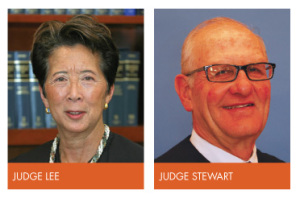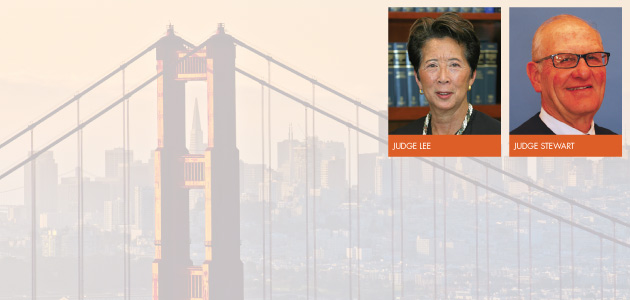 Judge Cynthia Ming-mei Lee was named presiding judge in the midst of the court funding crisis and massive layoffs in our Superior Court – 200 court employees and 11 Commissioners. Daunting. She quickly identified “three big ticket” items: reducing the trial backlog, expanding e-filing to all civil cases, and launching a Veterans’ Court. Judge Lee has successfully delivered on all three.
Judge Cynthia Ming-mei Lee was named presiding judge in the midst of the court funding crisis and massive layoffs in our Superior Court – 200 court employees and 11 Commissioners. Daunting. She quickly identified “three big ticket” items: reducing the trial backlog, expanding e-filing to all civil cases, and launching a Veterans’ Court. Judge Lee has successfully delivered on all three.
With a significant shortage of judicial officers and support staff, Judge Lee faced a backlog of 60-75 cases from 2011 and 2012, layered onto the existing weekly trial caseload on the Master Calendar. The remedy needed to be multi-faceted and nothing short of a cultural change was required to accomplish her goal.
Judge Lee’s philosophy was that trial dates needed to be “real,” meaning that all cases would be sent out to trial and not continued time and again to future dates. She changed the practice of the Master Calendar by sending cases out to trial on the dates (or week) set, trailing cases until a courtroom opened, and sending cases to settlement conferences; this she did each week for two years, thus eliminating the backlog of the previous years and clearing the trial calendar.
Judge Lee was well aware that the current judicial funding formula (Workload Allocation Funding Methodology) utilizes volume of filings as a factor in allocating funding, and that San Francisco needed to establish itself as a desirable place to file litigation, thereby safeguarding its funding allocation. Moreover, she recognized that a “real” trial date clearly benefits litigants awaiting their day in court. Utilizing volunteer pro-tems for Discovery, Traffic Court and voluntary settlement conferences allowed better allocation of trial resources – a shift in practice launched by former Presiding Judge Katherine Feinstein and honed under Judge Lee.
Judge Lee implemented the Assigned Case Management program, to assign cases to bench officers for case management only. Typically, the cases involved complex multi-party cases or cases which seemed to result in a high volume of law and motion practice. To date, six judges are participating in the program.
Judge Lee understood as well, that any and all changes needed to be strategic and she made a personal commitment to triage the work. With the help of temporary filing clerks who served one-year assignments, Judge Lee was able to achieve her goal of reducing the backlog in defaults and unfiled paperwork. The clerk’s office had a backlog of paperwork that filled the length of three football fields (files standing on their sides); currently there is no backlog – a key aspect of the Electronic Information Management (EIM) plan she has overseen during her term.
To fulfil her commitment to institute e-filing in all civil cases, Judge Lee sponsored the EIM e-filing projects. The court first mandated e-filing in 2006 in asbestos litigation; the mandate was expanded to include Complex Litigation cases in 2012 and Probate Trust cases in 2013. Working closely with the court’s CEO T. Michael Yuen and Administrator Wayne Parinas, Judge Lee has overseen an expansion of mandatory e-filing to include all General Civil case types (except limited Unlawful Detainer and Small Claims cases).
In the Criminal Division, consolidating the work of multiple courtrooms and re-configuration of duties allowed Judge Lee to open another full-time Criminal trial court, resulting in fewer Criminal cases being sent to the Civic Center courthouse, which in past years had resulted in the displacement of Civil cases.
Finally, Judge Lee’s commitment to our veterans resulted in a Veterans Justice Court within the Community Justice Center (CJC) at no additional cost. The pilot program proved so successful, a recent grant of $350,000 will permit a 2015 stand-alone court for veterans at the Hall of Justice.
In addition to making good on her commitment to our veterans, Judge Lee also remedied a shortage of support for two other vulnerable populations: dependent youth and the elderly. A much needed Dependency court reopened with the rehire of two part-time Commissioners, and the rehire of a Probate Examiner has reduced a significant backlog in the Probate Court.
The challenge of her tenure as PJ was “not to make change for the sake of change, but to do things better, to lead people in creating the change needed.” She credits the hard work of her predecessor, Judge Feinstein, Yuen, the court staff, as well as the volunteers from BASF who provided a very essential bridge over the widening gap in services.
Judge Stewart, unanimously elected as Presiding Judge, takes the helm January. A Stanford Law graduate, Judge Stewart’s background is civil litigation (decades with Carroll, Burdick and McDonough and 11 years as managing partner). Since taking the bench in 2000, Judge Stewart has become well known for his collegiately, approachability, and his thoughtful, thorough approach to litigation. He has presided in our Civil, Criminal, Delinquency and Appellate courts; this breadth and depth of experience in so many courts provides a highly valuable perspective on each. He is also a veteran leader, having served two years as the assistant presiding judge and four years with the court’s executive committee; he has also served as the supervising judge of the Criminal Courts as well as the presiding judge of the Appellate Division which hears and decides appeals from Misdemeanor, Traffic and Limited Civil Jurisdiction cases.
With a much reduced backlog, Judge Stewart plans to expand the single assignment program to include additional judges who will both case manage and try the cases. This should help ease the burden on the single Law and Motion Department and facilitate earlier hearing dates. Also, Mediation will be expanded to provide judges for Mediation sessions, provided both sides request it. At the same time, Judge Stewart is quick to acknowledge the important contributions of BASF as pro-tems in Traffic, Discovery and Settlement for “they’ve been terrific!”
Judge Stewart, like Judge Lee is equally committed to veterans and joined in Judge Lee’s recent assignment of Judge Jeffrey Ross, with whom Judge Stewart regularly volunteers at Stand-Downs, to the newly created veterans stand-alone court.
Judge Stewart, along with the rest of the court, is looking forward to replacing the Court Management System (CMS) with an entirely new system so “we may run our court in the 21st century.” The current CMS is outdated and difficult to navigate. An outside vendor has been engaged to design the new system and the first phase will update Traffic and Criminal to be followed by Civil. By April 2016, the public will be able to access criminal records and files and pay fines by installments – all online. The undertaking is monumental and everyone accessing our courts currently knows of its importance and heartily welcomes Judge Stewart’s leadership to implement this much needed change.
With five vacancies on the bench and continuing budget issues, the challenges facing Judge Stewart are significant, but clearly the vision of our presiding judges and CEO and their plans for our Superior Court will serve the public and legal community well.
About the author:
Julie Traun is a criminal defense attorney in private practice in San Francisco, and currently serves as the Director of Court Programs of the Lawyer Referral and Information Service of BASF. The Court Programs qualify and calendar highly experienced attorneys to represent indigent clients in criminal, delinquency and dependency courts, and pursuant to a contract with the Superior Court, review and process all billing in connection with these services.





0 comments on “Presiding Judges Cynthia Ming Mei Lee and John Stewart: Reflections and Plans for the Future”